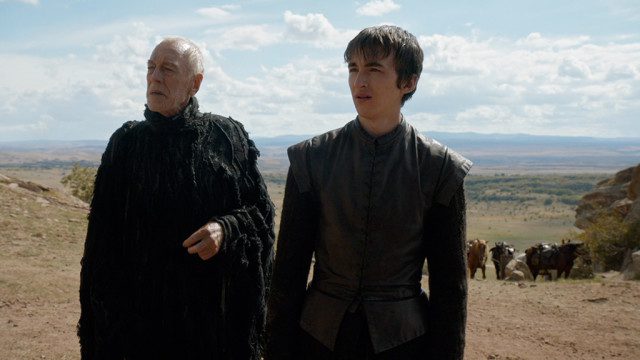Hey, look at that: Game of Thrones found a way to make Jon Snow interesting again. All it had to do was kill him off and call a Mulligan. “Oathbreaker,” while not quite as good as last week’s stellar installment “Home,” promised some exciting developments not just for Jon Snow but for the entire cast. Season six is already better than season five, and it’s not even close.
Let’s talk about that first scene with Jon, Davos, and Melisandre. I’m glad GoT took the time to address what an incredibly awkward conversation it must be – what do you say to someone who’s been dead for a few days? What could you say to them? In that case, Davos is the perfect person to be there when Jon awakes. He and Jon have a great chemistry; Davos is paternal but never takes on a mentoring role. He has an enormous amount of respect for Jon but still wants to protect him. Once again, Liam Cunningham makes a strong case for himself being this show’s understated MVP.
“I did what I thought was right, and I got murdered for it.” The dialogue here is loaded and charged, and threatens to upend the core mythology of Game of Thrones with one simple line. When Melisandre asks Jon what he saw after dying, Jon responds, “Nothing. There was nothing at all.” The Lord of Light has exerted the most obvious power of any deity on the show, but the idea that there’s nothing but blackness after death undermines the whole concept of religion. It’s bleak and nihilistic, and a good route for Jon’s character to take.
The show knows it, too. His first act as the newly-resurrected Lord Commander is to order the execution of four men responsible for his death, Alliser Thorne and Olly chief among them. Alliser has always been a good antagonist for Jon, even if the men gained a grudging respect for each other during “The Watchers on the Wall,” and Olly killed both Ygritte and Jon, making him Tumblr’s public enemy number one. Yet there is no catharsis or satisfaction in their deaths. “Oathbreaker” underscores this by having Jon walk away, handing his coat to Edd, and apparently resigning from the Night’s Watch. “My watch is ended,” he says, and this is the most interesting that Jon Snow – or Kit Harrington – has been in ages. Game of Thrones is really flexing its storytelling muscle lately.
Speaking of which: Bran’s visions. They’re a great way to fill the viewer in on what happened before the series, and I enjoy them…but how will they tie in to the larger narrative? Now, strictly speaking they don’t have to. Not every subplot does (unless Arya comes back to kill Cersei). But occasionally the visions seem like a narrative stall, but it’s the kind that I’m okay with because #1, Max von Sydow, and #2, they’re usually pretty enjoyable.
The Tower of Joy is something that viewers have been wanting to see for the whole series (sorry if that sounds like an over-exaggeration; it’s not). It’s nice seeing a young Ned Stark, not quite as honorable as the version we’re used to, square off against Arthur Dayne, the Sword of the Morning and one of only two men who Jaime Lannister said could beat him in a swordfight (the other being Barristan Selmy). The scene doesn’t go quite as far as the previews promised it would, but I imagine we’ll be coming back to it. Especially because these are the only real glimpses we get of Robert’s Rebellion, barring some Game of Thrones Muppet babies prequel series.
Guess what else the show is fixing? King’s Landing. I should elaborate: when I say “fixing,” I don’t mean that any of these plots were ever boring, per se, but keeping a character in one location for six season (Cersei) always comes with a risk of stagnation. But seeing Cersei and Jaime – and Zombie Mountain, finally addressed as Ser Gregor – in full-on rampage mode is a good sign. An even better sign is the rebellion of the small council. I can count on zero fingers how many fucks Kevan Lannister gives about Cersei or the Mountain; those fucks become exponentially less when the Queen of Thorns is in the room. “Margaery is the queen,” she tells Cersei. “You are not the queen, because you are not married to the king.”
Lastly, I want to touch on Ramsay Bolton. He’s the closes thing this show has right now to a central villain, and Iwan Rheon is doing fine work with the character, and putting him in a position where he gets to exert more agency is a smart move. We get to see how Ramsay thinks, not just how he acts. That said, I’m scared at the prospect of him doing either when it comes to Rickon Stark and Osha, both of whom make their return in “Oathbreaker” (as does Rickon’s direwolf Shaggydog – or part of him at least). I’m torn here, because while I don’t want to see Rickon given the Theon treatment, I also don’t really care that he’s back. I’ll take Rickon if it means Osha returns, but let’s be honest, Rickon Stark is the most narratively useless character in contemporary fiction. But Game of Thrones is getting smarter, and I doubt the show brought Rickon back just to kill him.
A Few Thoughts
- Anybody else super glad that Jon didn’t warg into Ghost, like a good subset of the Internet assumed he would. Fuckin’ Internet thinks everyone is a warg. When a character dies who they want to live, they just assume that character is a warg. This has never, ever been proven correct.
- Loved Arya’s training montage. Possibly the most WTF character arc I’ve ever seen.
- Vaes Dothrak looks like Burning Man – a bunch of half-naked people camped out in the desert.


